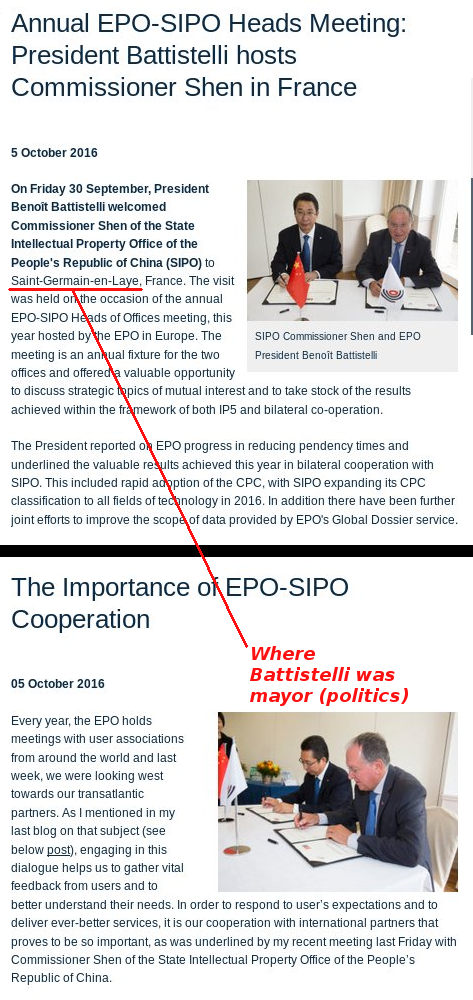'SIPO Europe': More Low-Quality Patents at Lower Costs
- Dr. Roy Schestowitz
- 2018-04-05 13:45:41 UTC
- Modified: 2018-04-05 13:45:41 UTC
'System Battistelli'
 References: Battistelli and China, 2016 [1, 2]
References: Battistelli and China, 2016 [1, 2]
Summary: As 'demand' declined (the number of applications for European Patents was falling) the EPO lowered prices and it's doing it again, basically assuring more low-quality, low-value applications to be followed by more low-quality patents granted, externalising the cost of patents to the public and outsourcing examination to courts (where lawyers make the most money)
THERE are persistent rumours about
EPO layoffs; it's more of a question of
when, not
if. What the EPO
neglects to speak about are discounts it gave to spur or 'create' applications, irrespective of quality. China, with a tiny share of EPO patents/applications (about the same as Korea and about a third of Japan's), was the main talking point. Is the EPO becoming another SIPO? China's SIPO is globally notorious for its very low bar; and few even know what's in there because it's in Mandarin. It's a patent-printing machine which devalues the 'currency' which is patents, but WIPO loves it because it helps fake/create an illusion of considerable growth.
"Is the EPO becoming another SIPO?"Judging by yesterday's official announcement (warning: epo.org link), complete with the obligatory Battistelli plug/quote, the EPO foresees/wants lots of low-quality patents to help pretend that the number of applications grows. In the EPO's own words:
Acting on a proposal of the European Patent Office, the Administrative Council of the European Patent Organisation, had approved the fee reduction for patent applications in December 2017.
So even the Administrative Council is all over this. They can only pretend not to understand the objective of such policies; but examiners know
very well what that means in practice. The examiners are typically guardians against bad patents that enable abuse (like patent trolls who bypass the court system); now they're not allowed to do this kind of job because of so-called 'demand' or "efficiency".
⬆

 References: Battistelli and China, 2016 [1, 2]
References: Battistelli and China, 2016 [1, 2]